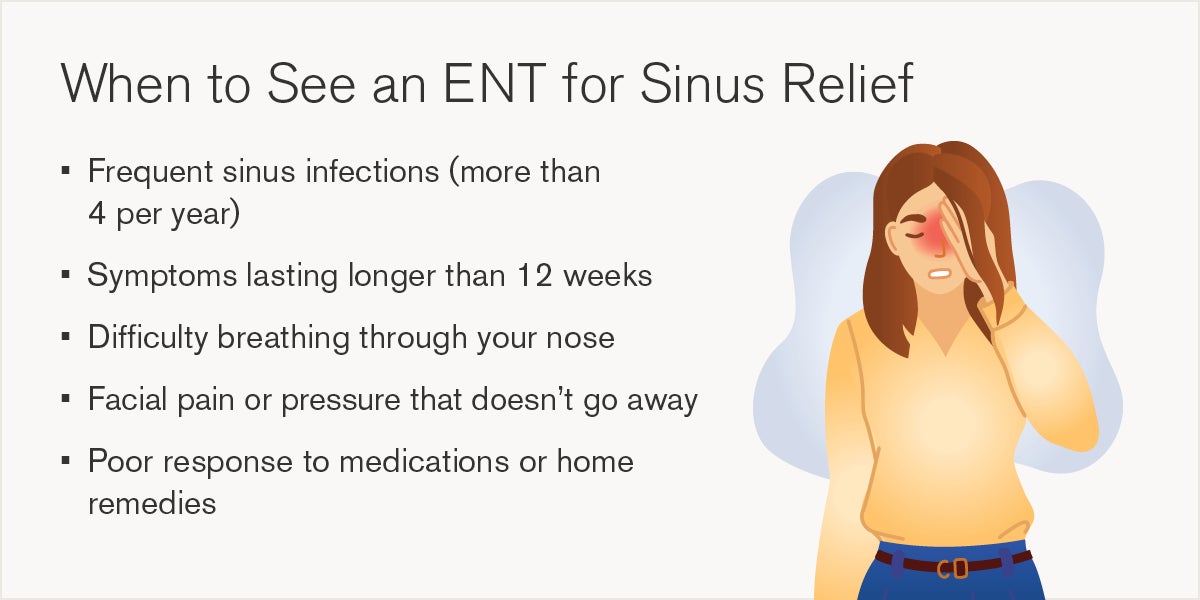Your sinus relief toolkit: From home remedies to expert care
September 3, 2025
Categories: ENT/Otolaryngology
Tags: sinusitis, Sinus Relief, nasal congestion
If you’ve ever felt like your nose is permanently stuffed, your face is under pressure, or you’re constantly battling sinus infections, you’re not alone. Millions of people suffer from chronic sinusitis and nasal congestion that disrupt sleep, concentration and overall quality of life. While home remedies and over-the-counter medications can offer temporary relief, they’re not always enough.
“For many people, there’s no need to struggle alone. There are a lot of options, everything from over-the-counter medications and in-office procedures to surgery and allergy shots. It’s just individualized care depending on what the patient needs and wants,” says Monica Patadia, MD, an otolaryngologist at Loyola Medicine.
What are sinuses and why do they become inflamed?
Sinuses are four pairs of air-filled cavities located in your forehead, cheeks and behind your nose. These hollow spaces are lined with mucus-producing tissue that helps trap and flush out bacteria, allergens and other irritants.
When functioning properly, sinuses drain smoothly into the nasal passages. But when inflamed or blocked, they can cause many uncomfortable symptoms, such as sinus inflammation, also known as sinusitis. These symptoms can be triggered by a number of causes, including:
- Viruses (like the common cold)
- Bacterial infections
- Fungal infections
- Allergies
- Structural issues like a deviated septum or nasal polyps
When drainage becomes blocked, it can lead to facial pain from pressure or congestion and sometimes fever or fatigue. There are also different types of sinusitis which are classified by duration and cause:
- Acute sinusitis: Lasts less than four weeks, often viral.
- Subacute sinusitis: Lasts four to 12 weeks.
- Chronic sinusitis: Persists for 12 weeks or more, often bacterial or structural.
- Recurrent sinusitis: Multiple episodes per year.
At-home treatments for sinus relief
Before considering advanced procedures, many patients begin with at-home strategies to manage sinus discomfort. These methods can be effective for mild or occasional symptoms and are often the first line of defense.
Hydration and steam
Hydration and steam are two of the simplest yet most effective ways to ease sinus pressure. Drinking plenty of fluids helps thin mucus, making it easier for your sinuses to drain. Steam inhalation, whether from a hot shower or a bowl of steaming water, can soothe inflamed nasal passages and loosen congestion. The warmth and moisture help open up blocked sinuses and provide temporary relief.
Soothing techniques
Another simple approach involves soothing techniques like warm compresses and saline rinses. Applying a warm compress to your face can reduce sinus pressure and alleviate pain. Saline rinses, often done with a neti pot or saline spray, help flush out mucus, allergens and irritants from the nasal passages. When done correctly, nasal irrigation is a safe and effective way to keep your sinuses clear.
“The best at-home remedy is, usually, sinus irrigations. However, only sterile or distilled water should be used. Some people use tap water and that’s actually dangerous due to microorganisms that are harmless when swallowed, but harmful when used for nasal rinsing,” says Dr. Patadia.
Over-the-counter medications
Many people also turn to over-the-counter medications for additional support. Nasal sprays are commonly used to reduce swelling and improve airflow. Decongestant sprays can offer quick relief but should be used sparingly, typically no more than three consecutive days, to avoid rebound congestion. Steroid sprays, on the other hand, can be used longer and help reduce inflammation over time. Antihistamines and pain relievers may also be helpful, especially if allergies or sinus pressure are contributing to your symptoms.
“While many sprays are helpful for relieving congestion, the one spray that people should not be using often is oxymetazoline. It works very quickly but is not safe for long-term use and can become addictive,” says Dr. Patadia.
Lifestyle adjustments
Lifestyle adjustments can make a meaningful difference in how your sinuses feel day to day. Elevating your head while sleeping encourages better sinus drainage and can reduce nighttime congestion. Avoiding irritants like cigarette smoke, pollution and strong fragrances is also key, as these can inflame your nasal passages and worsen symptoms. Using air purifiers and keeping your home clean can help minimize exposure to allergens.
Signs you should consult an ENT specialist
If you’ve tried everything and still feel congested, it may be time to seek expert help. Chronic sinus issues can significantly impact your quality of life, and persistent symptoms may indicate a deeper problem. If you experience these symptoms, it may be time to speak with an expert and receive personalized care.

Advanced sinus treatments at Loyola Medicine
The nasal sinus center at Loyola Medicine offers cutting-edge solutions for patients who need more than temporary relief. Loyola’s ENT specialists are nationally recognized for their expertise and have trained hundreds of physicians across the country, offering unique treatment options.
Functional endoscopic sinus surgery (FESS)
FESS is a minimally-invasive procedure that uses a small camera to access and clear blocked sinus pathways through the nostrils with no external incisions required. There is also minimum downtime with most patients returning to work within one to two weeks. It’s typically recommended for patients with:
- Chronic sinusitis
- Nasal polyps
- Recurrent infections
- Structural abnormalities
Some of the benefits of the procedure include restoring normal drainage and airflow, reducing facial pain and pressure and improving breathing and sleep.
“While this procedure isn’t a permanent solution, it allows the sinuses to drain appropriately so medications can actually work in the future,” says Dr. Patadia.
Turbinate reduction surgery
Turbinates are small structures inside the nose that help humidify and filter air. When they become enlarged, they can block airflow and cause chronic congestion. Turbinate reduction is a procedure that shrinks these tissues to open the nasal passages. For many patients, this procedure can enhance breathing, reduce snoring, and is often performed alongside FESS for comprehensive relief.
Take the next step toward sinus relief
Living with chronic sinusitis, nasal congestion or sinus headache doesn’t have to be your norm. If home remedies and over-the-counter treatments aren’t cutting it, Loyola's specialists are here to help. Their advanced procedures and personalized care have helped countless patients breathe easier, sleep better and reclaim their daily comfort.

